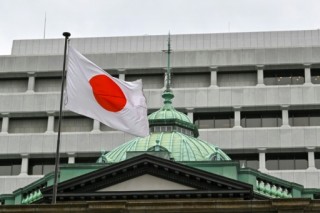Loading
Search
▼ Japan's 1st-Quarter GDP Shrinks, Hit By COVID Restrictions, Higher Prices
- Category:Other
Japan's economy shrank slightly in the first quarter of 2022, official data showed Wednesday, hit by COVID-19 restrictions and higher prices.
The world's third-largest economy shrank 0.2 percent quarter-on-quarter in the January-March period, slightly less than the market expectations of a 0.4 percent contraction.
It followed a modest rebound in the final three months of 2021 that proved short-lived after Japan put COVID restrictions in place as an outbreak fueled by the Omicron coronavirus variant took hold in January.
Growth was also hit by the rising cost of imports with energy prices surging and the yen falling to its lowest level against the dollar in 20 years.
Economists expect the economy to recover again in the April-June quarter now that virus restrictions have been lifted, but caution there are some caveats.
"We see three headwinds to this expected recovery," said UBS economists Masamichi Adachi and Go Kurihara in a note ahead of the GDP data release.
"First is a rise in food and energy prices. Second is a drag from the lockdown in China," and third is the risk of a potential resurgence in virus infections, they said.
Others point to ongoing uncertainties linked to "tensions in international relations and military conflicts", according to a survey among economists conducted by the Japan Center for Economic Research.
During the current earnings season, major Japanese firms such as Sony and Nissan have offered cautious forecasts because of the uncertainty, particularly over supply chain disruption and the effect of COVID lockdowns in China.
Wednesday's data showed the economy's rebound in the last quarter of 2021 was 0.9 percent, slightly weaker than an initial estimate of 1.1 percent growth.
Japan is battling a series of economic headwinds linked to the pandemic and Russia's invasion of Ukraine, which has sent energy costs soaring.
The yen has also slumped against the dollar, with a widening gap between Japan's ultra-loose monetary policy and tightening in the United States as the Federal Reserve attempts to combat inflation.
Rising energy prices and other hikes are squeezing Japanese consumers and businesses, with household spending dipping 2.3 percent in March from a year earlier.
Analysts have warned that the pace of nominal wage increases in Japan is unlikely to track rising prices, dampening spending appetites.
Last month, the government unveiled a 6.2 trillion yen (around $48 billion) economic package that included handouts for low-income families to help cushion the impact of rising prices and energy costs.
Looking ahead, "net trade will boost growth over the coming months as supply shortages ease and the weak yen boosts exports and softens demand for imports," Tom Learmouth, Capital Economics economist, said in a note.
"With coronavirus cases continuing to fall and nearly 60 percent of the population triple-jabbed, another round of restrictions looks unlikely for now."
"However, we expect GDP growth to disappoint across 2022 due to the hit to household income from higher inflation and signs that elderly consumers remain wary of catching the virus," he added.
Japan has seen a smaller COVID outbreak than many countries, although cases surged because of the highly transmissible Omicron variant.
The country has recorded around 30,050 deaths despite avoiding harsh lockdowns.
© 2022 AFP
- May 19, 2022
- Comment (0)
- Trackback(0)


